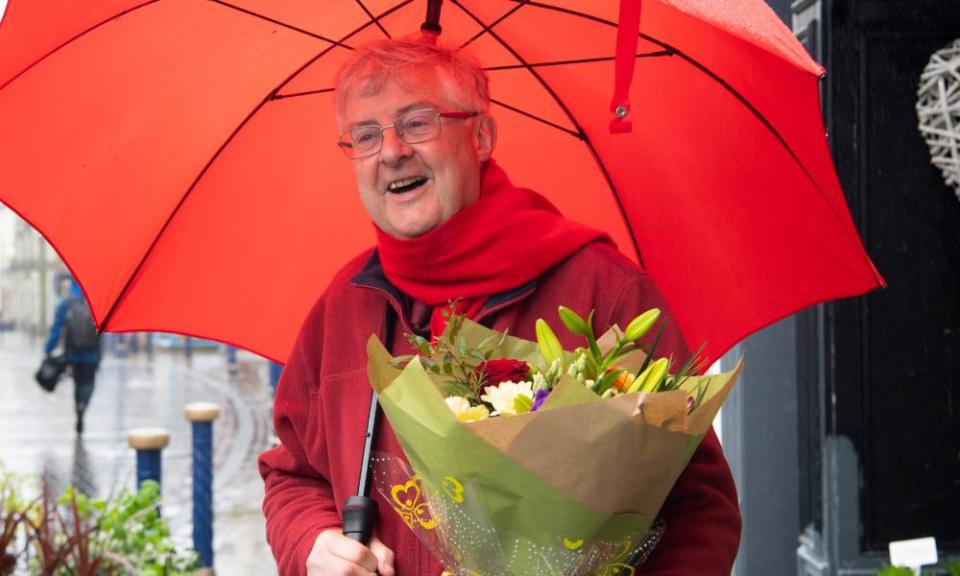‘Politics can sweep you away’: the 72 hours that changed Britain

The tension in Birmingham’s Utilita arena was palpable on Saturday as the results of the West Midlands mayoral election went down to the wire. There was a brief moment of shock at the count when first preference votes showed a win for Labour’s Liam Byrne. Some initially mistook it as the result for the whole West Midlands combined authority and declared Byrne the winner.
But the confusion was soon corrected. There would be no surprise triumph here for Labour. As the polls had predicted, it turned out to be a comfortable victory for the incumbent, the Tory former boss of John Lewis, Andy Street. Off the back of a hugely successful few days for the Tories, Andrew Mitchell, the Conservative MP for Sutton Coldfield, was in a buoyant mood at the count, rubbing salt into Labour wounds. “Andy has done very well indeed in the red wall seats,” he said. “He is a very attractive candidate.”
Over the previous week, Byrne had been insistent Labour was on course for success, saying on Tuesday that the polls didn’t bother him because “we are going to win”, and that his experience on the doorstep suggested many Tory voters were coming back to Labour. But his upbeat attitude was to no avail. As in so many parts of the country that Labour recently called its own, Thursday’s elections in the West Midlands showed the Tories had arrived to stay.
Even as millions of votes were being cast across England, Wales and Scotland on Thursday, deep gloom had set in from top to bottom of the Labour party. “It will be awful,” said a senior Labour MP several hours before the polls closed. “Unless there is an act of God before 2023 we will lose the next general election [which he was sure would be held in two years’ time]. I can’t really see how Starmer recovers from this.” In his view the Labour leader’s whole strategy had already failed and was beyond rescue. “All the Sir Keir stuff … it sounded like a good idea at the time. People needed a comfort blanket after the 2019 disaster. He looked reassuring. They thought they could come in and recover by doing three things: first, saying ‘We are not Jeremy Corbyn’; second, by presenting Sir Keir in a suit; third, by assuming people would reject Boris as a rogue. It just hasn’t worked.”

Starmer’s officials were briefing by mid-afternoon on polling day that the results in much of the country, including the Hartlepool parliamentary byelection, would be grim. So stark were the messages, and so uniformly pessimistic, that they sounded like part of a rather obvious spin operation, lowering expectations so that when the outcomes were not so dire, the results could all be sold as not so bad after all.
But when they came, they were as bad as – and if anything worse than – Labour people had warned. Starmer and his team, who ended up dramatically firing party chair and election coordinator Angela Rayner, had expected to lose Hartlepool, where the party had been saved at the 2019 general election by the Brexit party vote, which had split support on the right. But they had not anticipated the margin that was announced on Friday morning. The Tory candidate, Jill Mortimer, became the first Tory MP in the former shipbuilding constituency, storming home with almost twice as many votes as Labour’s anti-Brexit GP Paul Williams, whose views on the EU had not gone down well on many doorsteps.
After the result, Johnson sped up to the north-east on Friday morning to milk the moment, as ex-Labour voters complained that Starmer and his MPs had been in their area day after day during the campaign, but had had nothing at all to say.
Elsewhere in the region there were similar trends. The Tees Valley mayoral contest was crushing for Labour too, with the re-election by a huge margin of 34-year-old local Conservative Ben Houchen, who had identified himself as the embodiment of the Tories’ levelling-up agenda. Houchen secured a massive 73% of the vote behind what only a few years ago had been the Labour red wall.

The Tories also took control of a string of councils from Northumberland, to Dudley, and Nuneaton and Bedworth from no overall control. Labour lost Harlow – always seen as a bellwether of the national mood – to Boris Johnson’s party. Johnson described the results as “very encouraging”, while Labour’s shadow communities secretary, Steve Reed, went on the media early on Friday, choosing the word “shattering” to sum them up.
The Labour bickering and bloodletting that led to Rayner’s exit, as she was apparently held out to dry for the results, began immediately. Jeremy Corbyn refused to back Starmer, saying it was up to him whether he quit, while Peter Mandelson blamed the shadow of Corbyn for the defeat in Hartlepool, although more than a year had passed since Corbyn had departed the stage.
The map was not turning blue everywhere. By the end of Friday, it was clear that Labour had turned in its best ever result in Wales, winning 30 of the 60 seats in the Senedd. Incumbency over the course of the pandemic proved to be a benefit in these elections, not just for Johnson but for Labour, too, in other parts of the country. Andy Burnham was comfortably re-elected as mayor of Greater Manchester, while Sadiq Khan won for a second time as mayor of London. In the West Country, Labour even snatched the West of England mayoralty from the Tories, in another demonstration of how unpredictable, and local, the forces of change were proving to be.

But pockets of positivity for Labour apart, the political map was clearly being reshaped and overall it was good news for the Tories. They had consolidated their recent gains in the north of England and Midlands, and much of blue-collar England was continuing to turn blue. What Starmer’s party had hoped had been an aberration in 2019, when the Tories stormed over the red wall, was proving instead to be part of a gradual, albeit not uniform, trend.
One Labour frontbencher said the loss of working-class support had actually first shown itself in parts of the Midlands and north in the 2017 local elections in which Labour, under Corbyn, had done well overall. The past four days have seen previous certainties and assumptions about politics seemingly inverted. The Tories are now being spoken about as the party of working people, while some of Labour’s safest strongholds are in the country’s wealthier, metropolitan areas including London, Manchester and Bristol.
To add to the sense that deep changes are under way, the SNP’s push for a second independence referendum, which could lead to the breakup of the United Kingdom, has fuelled a wider impression of constitutional uncertainty.
For Starmer, the events of recent days will have been a brutal lesson. Only a few months ago, before Boris Johnson began to benefit from the successful vaccine programme, Starmer had surged ahead of Johnson in the polls and was judged to be doing well by most in his party. But, as one of his frontbenchers put it on Friday, the political mood then changed, with the end of the pandemic in sight, and Starmer was exposed without a post-Covid policy programme. Across the country, voters saw Labour as lacking a clear message. “Politics can do this,” said another frontbencher. “It can come and just sweep you away. You suddenly fall off a cliff. I really don’t think this was all Keir’s fault. But what is certain is that he will be judged, from now, on how he picks himself up from this.”
On Saturday even Starmer loyalists were beginning to wonder if he had it in him to bounce back. After the Labour leader staged a stiff response for TV cameras on Friday, saying he took personal responsibility, some of his closest allies could not hide their dismay. “He did it in front of a whole load of copies of Hansard, with what looked like a dead plant in the background,” said a senior ally. “He was sweating. It was awful. Getting these things right are the basics. It was just appalling.”
Another frontbencher said: “He looked like he had been fucking tasered. It was terrible.”
On Monday parliament returns before the Queen’s Speech on Tuesday. Talk of Boris Johnson being toppled by Tory sleaze that had dominated the news for weeks, and stories about his expensive choice of wallpaper for his Downing Street flat, have replaced by mutterings about whether Starmer can hang on as Labour leader, particularly as recrimination’s over Rayner’s firing grow just over a year after the party elected him. One shadow cabinet member told the Observer that this autumn’s party conference could be “the real test” for Starmer, suggesting that if he failed it, it could be curtains.
Johnson, meanwhile, has again proved that he enjoys an enduring appeal among many voters, despite his obvious shortcomings, personal and political. Many ex-Labour voters in places such as Hartlepool, who backed Brexit in 2016, switched from Labour in 2019 because Johnson had pledged to “get Brexit done”.
Ryan Shorthouse, chief executive of the modernising Tory pressure group Bright Blue, said the Tories, almost by accident, had rebranded themselves: “The 2021 election results, especially the historic by-election victory for the Tories in Hartlepool, confirm that the Tory brand has finally been detoxified, at least among former industrial areas in more northern parts of England and Wales.

“It is not the Tory modernisation project which David Cameron spearheaded to make the Conservatives electable again, that has delivered the stonking support the party is now receiving. Cameron did help, though, but rather unintentionally: by enabling Brexit. By supporting and delivering Brexit, the Conservatives have finally given voters in red wall seats a compelling argument to let go of the resentment towards them for closing down old industries.”
On Monday the shadow cabinet will meet amid speculation about a wider reshuffle. There is talk of sweeping changes, with key figures being removed from post. The parliamentary party also meets, with MPs from left and right, Blairites and Corbynites, blaming each other for what has gone wrong. Andy Burnham is increasingly being talked up as a potential successor. In just a few days the political map has changed, as has the entire mood inside the Labour party. as has the entire mood of British politics
“I feel sorry for Keir,” said another shell-shocked member of his frontbench team. “I don’t think he expected politics and leadership could be like this. But he knows now and suddenly he is in real trouble.”

 Yahoo Movies
Yahoo Movies 